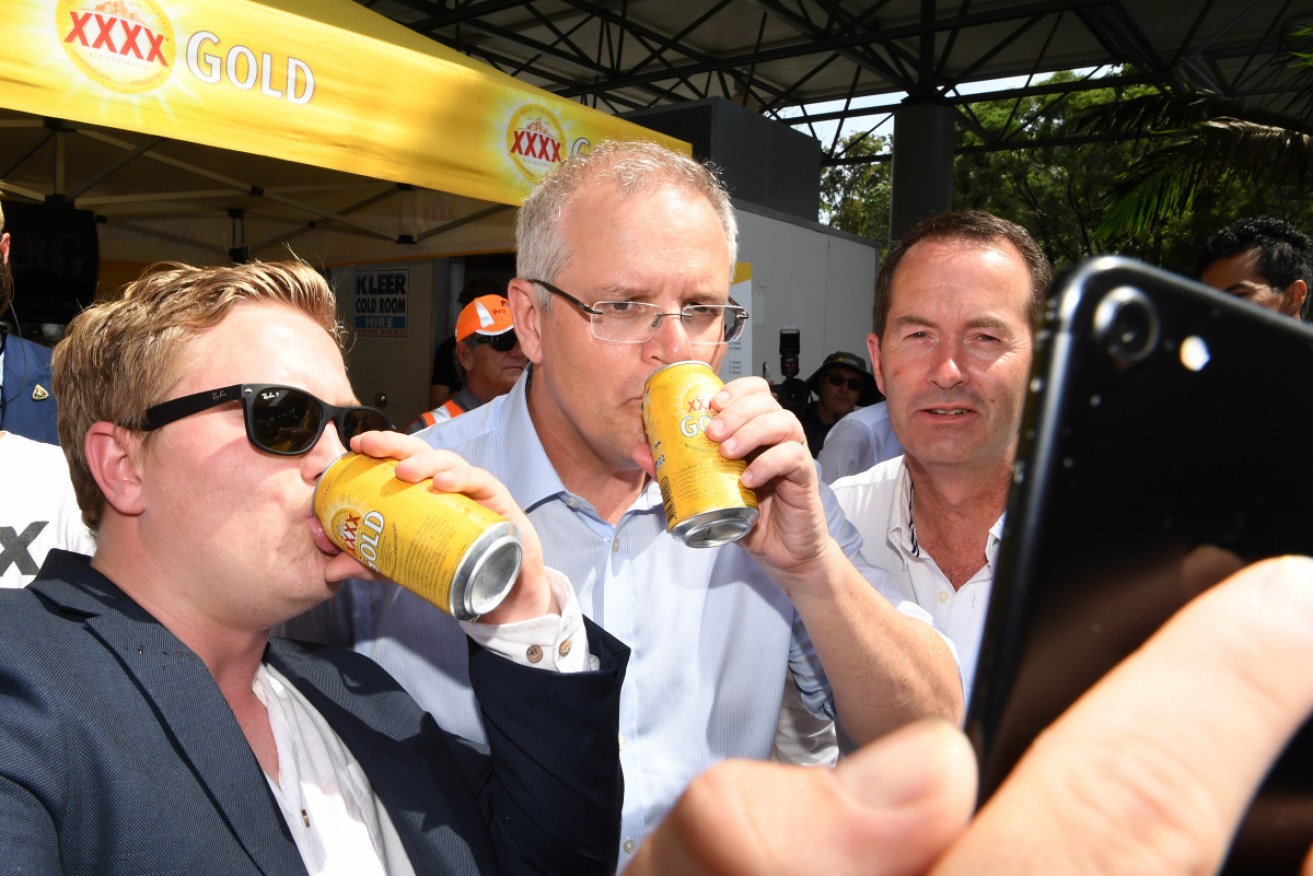The politics of faking it – Australia going all Trumpy


Meat pies and a “Daggy Dad” persona just aren't cutting for PM Scott Morrison. Photo: AAP
As Bill Shorten trots out his “Bill bus” for a Queensland election drive, and Scott Morrison whistles boat people and keeps having a go at a “if you have go, you’ll get a go” slogan, Australian politics is getting Trumpier.
Whether it’s Josh Frydenberg spouting deliberate falsehoods about tax policies or Shorten ramping up the class-warfare rhetoric, both sides are following the lessons of Trump, the Master Deceiver: identify with underdogs, attack “elites”, claim black is white and west is east if it suits.
It is excruciating to behold the competition to be seen as the most “fair dinkum”, appealing to the voter on the margin – a different person to the marginal voter.
Morrison’s fake Big Blue Bus trip up the Queensland coast was a joke – another Scotty stunt that backfired. Meat pies and a “Daggy Dad” persona do not a convincing prime minister make.
Not all that far behind, Shorten is quoted launching his bus odyssey at the Beenleigh Recreation and Bowls Club thus:
“It’s fantastic to be back in one of my favourite parts of Australia and back on the fair dinkum thing, the Bill bus, a real bus.”
Oh please. Beenleigh is OK, but “one of my favourite parts of Australia”? You might find some loyal residents with that view, but not many. As for any blow-in politician, just give it a rest.

“It’s fantastic to be … back on the fair dinkum thing, the Bill bus, a real bus.” Photo: AAP
And the more any politician, skilled in decades of political manoeuvring and compromise, calls something “fair dinkum”, the less it is likely to be.
What all the political parties are doing – and none more so than One Nation, or One Hanson as it should be called – is following Trump in being elite, while publicly damning elites.
The best political insight of 2018 was not in the millions of words churned out by the Canberra press gallery but in Rick Morton’s very fine, very brave and sometimes painfully raw book, One Hundred Years of Dirt.
Among other things, the book is about being poor in Australia, especially regional and outback Australia. Morton’s is not poverty observed, but poverty lived – there’s a big difference. And it’s not about poverty “back in the day” but poverty now, Australia now. He writes in the last chapter:
“This book emerged in part because of a silly fight over the meaning of the word ‘elite’, which has become one of those catch-all terms used by reactionaries as a means of cajoling the lower classes into a culture war. This strategy works because there is resentment out there – I’ve felt it most of my life – but not for the reasons those who wield it would have us believe.
“There is a palpable sensation that the elites, conservative commentators included, are sniggering at us behind our backs while we suffer degradations of health, education and economic policy.
“I say we, but by any standard I am now a middle-class man in the body of a poor boy, with a mind in both homes. The mendacity of the reactionaries is in the simple truth that this is all a performance for them.
“The right-leaning big-talkers are as well read and fed and housed as the most liberal academics in the universities. Largely, their concerns about the working class and, when it suits, the poor, are proportionate to the leverage they can pry from these people in a theatre of debate that will never include its subjects.
“The hard left does it too, and my friends from either side of the political spectrum are frequently guilty of seeing those beneath them as scarcely human, but useful rhetorical devices. They are the great uncounted who can be marshalled by any speaker clever enough to suddenly, and en masse, provide ballast for an idea.”
The Coalition and Labor are working overtime to grab the votes of the resentful. The resentful are core Trump supporters in the US, just as they are core One Hanson voters here. The informed “elites” can try all they like to tell such people that Trump and Hanson policies will actually harm them, but they run into what Mr Morton nicely described as:
“A persecution complex meets an ideological pyramid scheme, and voters are grist to the mill.”
Much of One Hundred Years of Dirt is about Deb Morton, a single mother with three children in a Queensland country town. Morton writes that his mother “fits precisely into no single set of party values”. If she were left alone in a room with a Labor voter, a Green, a moderate and a conservative Liberal, she would spend much of the time figuring out how to escape.
“It’s not because she doesn’t care about politics. It’s because her trust has been abused by all of the aforementioned at one stage or another.”
At the last federal election, One Hanson managed second place in almost every booth in Deb Morton’s electorate of Wright.
Much has been written about the Coalition’s jump to the right, stirring the racial and sectarian pots, has been about the idea that it would attract One Hanson voters.
Labor winning the Longman by-election indicates that sort of “hard right” isn’t necessarily what it’s all about. After six years in government, continuing to blame Labor for problems has worn thin.
The “Bill bus” is another attempt, tapping into the resentment with policies that will cost the better-off more and the promise to spend the money on health and education. The Australian Financial Review headlined Shorten’s Queensland campaign as ramping up class warfare.
Rather than whistling up Muslims, “African gangs” and boat people, Labor is blaming family trusts and landlords.
There’s plenty of resentment to go around.








